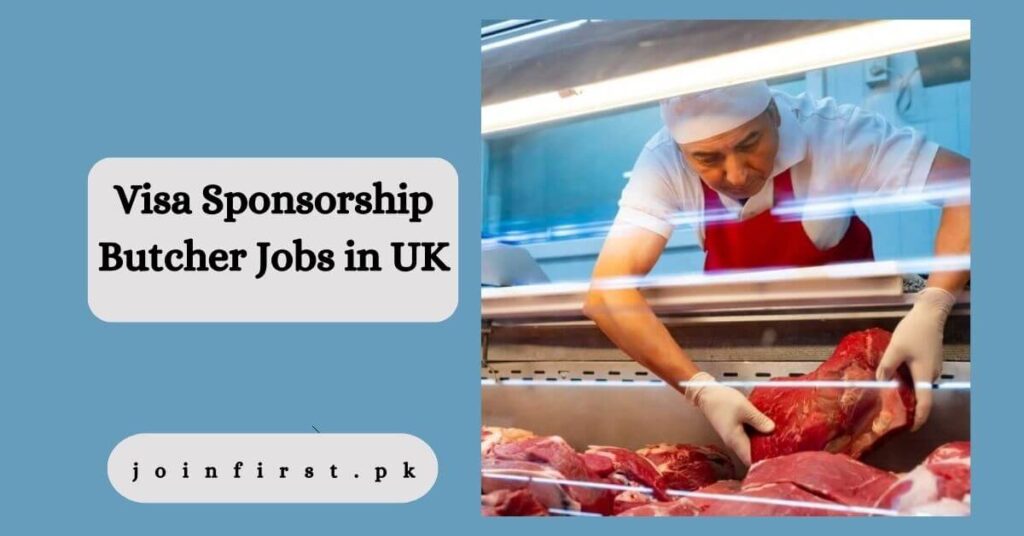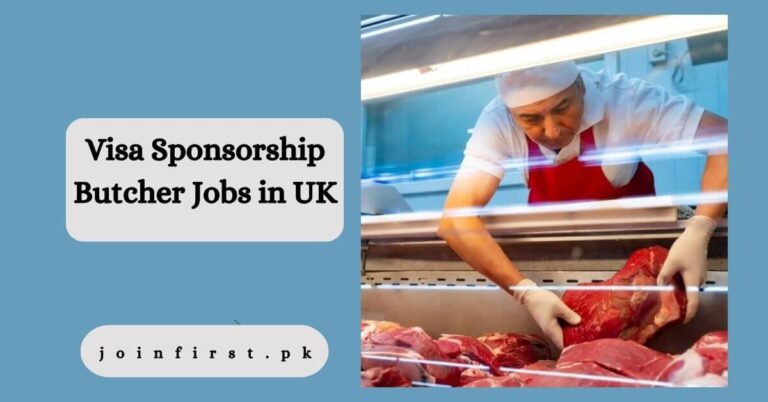
Visa Sponsorship Butcher Jobs in the UK (2025): A Comprehensive Guide
Introduction
Visa Sponsorship Butcher Jobs in the UK 2025. In 2025, the demand for skilled butchers in the UK continues to rise due to a combination of domestic labor shortages, increased meat consumption, and the strict standards required in meat preparation and food safety. The UK’s meat industry—covering beef, lamb, pork, poultry, and game—is a critical part of the national food supply chain, and the country often looks beyond its borders to find trained professionals to meet workforce gaps.
One of the key ways international workers can legally secure employment in the UK meat industry is through visa sponsorship. This article offers a complete and in-depth look at butcher jobs in the UK that offer visa sponsorship, including job roles, eligibility, salaries, application process, employers, visa types, and tips for international applicants.
1. Why the UK Needs Butchers in 2025
Several factors have driven the demand for butchers in the UK:
- Post-Brexit labor shortages: Many EU nationals left the UK labor market, leaving a void in the food processing and meat industries.
- Aging workforce: The UK’s skilled butcher population is aging, and fewer young people are entering the trade.
- Rural depopulation: Many butcher jobs are based in rural areas, where local labor pools are limited.
- Strict meat handling standards: The UK has some of the world’s highest food hygiene and safety standards, requiring trained professionals.
As a result, UK employers are now more open than ever to sponsoring qualified butchers from abroad, especially from countries with established meat industry training programs.
2. Common Roles for Butchers in the UK
Visa-sponsored butcher jobs vary depending on the employer’s needs, but common roles include:
- Slaughterhouse Butcher: Involves humane animal killing, primary meat cutting, and carcass preparation.
- Meat Processor / Boner: Specializes in removing bones and sinew from meat for packaging or further processing.
- Retail Butcher: Works in supermarkets or butcher shops, preparing cuts of meat for customers.
- Factory Butcher: Works in large-scale meat processing plants, performing specific repetitive tasks with speed and accuracy.
- Halal / Kosher Butcher: Specializes in religious methods of slaughter and meat preparation (requires certification).
3. Visa Sponsorship – What It Means
Visa sponsorship means that a UK employer applies to the UK Home Office for permission to hire a foreign worker under a specific visa route. The most common route for butchers is the Skilled Worker visa, which allows foreign nationals to live and work in the UK legally.
To offer sponsorship, the employer must be registered as a UK licensed sponsor and provide the worker with a Certificate of Sponsorship (CoS).
4. Skilled Worker Visa for Butchers – 2025 Requirements
As of 2025, butcher jobs are still listed on the UK’s Shortage Occupation List, making it easier for foreign workers to qualify for a Skilled Worker visa.
Basic Requirements:
- A valid job offer from a licensed UK sponsor.
- A Certificate of Sponsorship.
- Job offer must meet the minimum salary threshold.
- Proof of English language proficiency (e.g., IELTS).
- TB test (if applicable, depending on your home country).
- Sufficient financial resources (or employer may certify maintenance).
Salary Threshold:
- Minimum salary: £23,200 per year or £11.90 per hour (subject to changes based on sector or role).
- Salaries may be higher depending on the employer and region.
Job Code for Butchers:
- SOC Code: 5431 (Butchers)
5. Duties and Responsibilities of a Sponsored Butcher in the UK
Butchers sponsored by UK companies are expected to:
- Use knives and cutting tools safely and efficiently.
- Prepare standard cuts of meat (steaks, chops, joints, mince).
- Debone meat while minimizing waste.
- Maintain hygiene standards and work in chilled environments.
- Pack and label products for retail or wholesale.
- Follow health and safety regulations, including HACCP procedures.
- In some cases, perform slaughtering tasks following legal and religious guidelines.
6. Typical Employers Offering Sponsorship
Visa sponsorship is more likely to be offered by larger companies that can afford the administrative and financial burden. Common types of employers include:
- Meat processing plants: These are large-scale operations where the majority of sponsorship opportunities are found.
- Supermarket chains: Some large chains employ in-house butchers and sponsor workers for distribution centers.
- Abattoirs / Slaughterhouses: Require skilled slaughterers and boners, often in rural areas.
- Exporters and wholesalers: Particularly those exporting halal or premium UK meat.
- Specialty meat shops: Some high-end or niche shops may sponsor workers with unique skills.
7. Working Conditions and Environment
- Temperature: Cold storage rooms (0–5°C) are common in processing facilities.
- Physicality: Work involves standing for long hours, lifting heavy loads, and repetitive motions.
- Shifts: Early mornings or night shifts are common.
- Rural locations: Many facilities are outside cities, so accommodation or transport may be needed.
- Protective gear: Use of PPE (gloves, chainmail, aprons, boots) is mandatory.
8. Qualifications and Experience Required
You do not always need formal education, but the following are valued:
- At least 1–2 years of professional experience in meat cutting or processing.
- Formal training or apprenticeship in butchery (especially from countries with strong meat industries, such as Australia, South Africa, Brazil, Philippines, India, or Eastern Europe).
- Certificate in Meat Processing or Butchery (optional but beneficial).
- Specialization certificates (e.g., Halal or Kosher certification).
9. How to Apply for Butcher Jobs with Visa Sponsorship
Here’s a step-by-step guide to finding and applying for these roles:
- Prepare your CV: Tailor it for butchery jobs. Focus on meat cutting, deboning, hygiene standards, and safety compliance.
- Search for jobs: Use platforms like job boards, recruitment agencies, or directly through major meat company careers pages.
- Confirm sponsorship availability: Only apply to employers with sponsorship licenses.
- Apply and interview: You may be interviewed online. Emphasize your skills, speed, accuracy, and food safety knowledge.
- Receive Certificate of Sponsorship: Once selected, the employer will issue a CoS.
- Apply for Skilled Worker visa: Submit documents including your CoS, language test result, and proof of funds.
- Wait for visa approval: Usually takes 3–8 weeks.
- Travel and begin work: Some employers help with relocation or accommodation.
10. Benefits of Visa-Sponsored Butcher Jobs
- Legal right to live and work in the UK
- Pathway to UK settlement (Indefinite Leave to Remain) after 5 years
- Bring dependents (spouse and children)
- Opportunity to work for a reputable UK company
- Possibility of career progression into supervisory or training roles
11. Challenges to Consider
- Cultural adjustment: Language, customs, and working style differences.
- Cost of living: Especially in the UK’s urban areas.
- Rural locations: May be isolated, and transport could be limited.
- Physically demanding work: Requires good stamina and health.
- Visa rules: Tied to your sponsoring employer; changing jobs requires a new sponsor.
12. Tips for Success
- Learn and use proper English meat cutting terminology.
- Practice your knife skills before applying.
- Take an English language course if needed to pass IELTS.
- Research UK hygiene and safety standards.
- Look for employers that offer relocation support.
- Highlight any international certifications or experience in HACCP environments.
- If possible, get references from previous meat industry employers.
Conclusion
In 2025, butcher jobs in the UK that offer visa sponsorship present a promising opportunity for skilled international workers. The combination of a national labor shortage, high demand for safe and professional meat processing, and an established visa system makes it a realistic and attainable career path. For applicants with the right skills, training, and determination, the UK meat industry offers not only employment but also the chance to build a stable future in one of the world’s most regulated and respected food systems.
If you’re a qualified butcher seeking international experience and a pathway to UK residency, this could be your ideal opportunity. Prepare thoroughly, apply smartly, and you could soon find yourself sharpening your knives in a professional UK meat facility.






